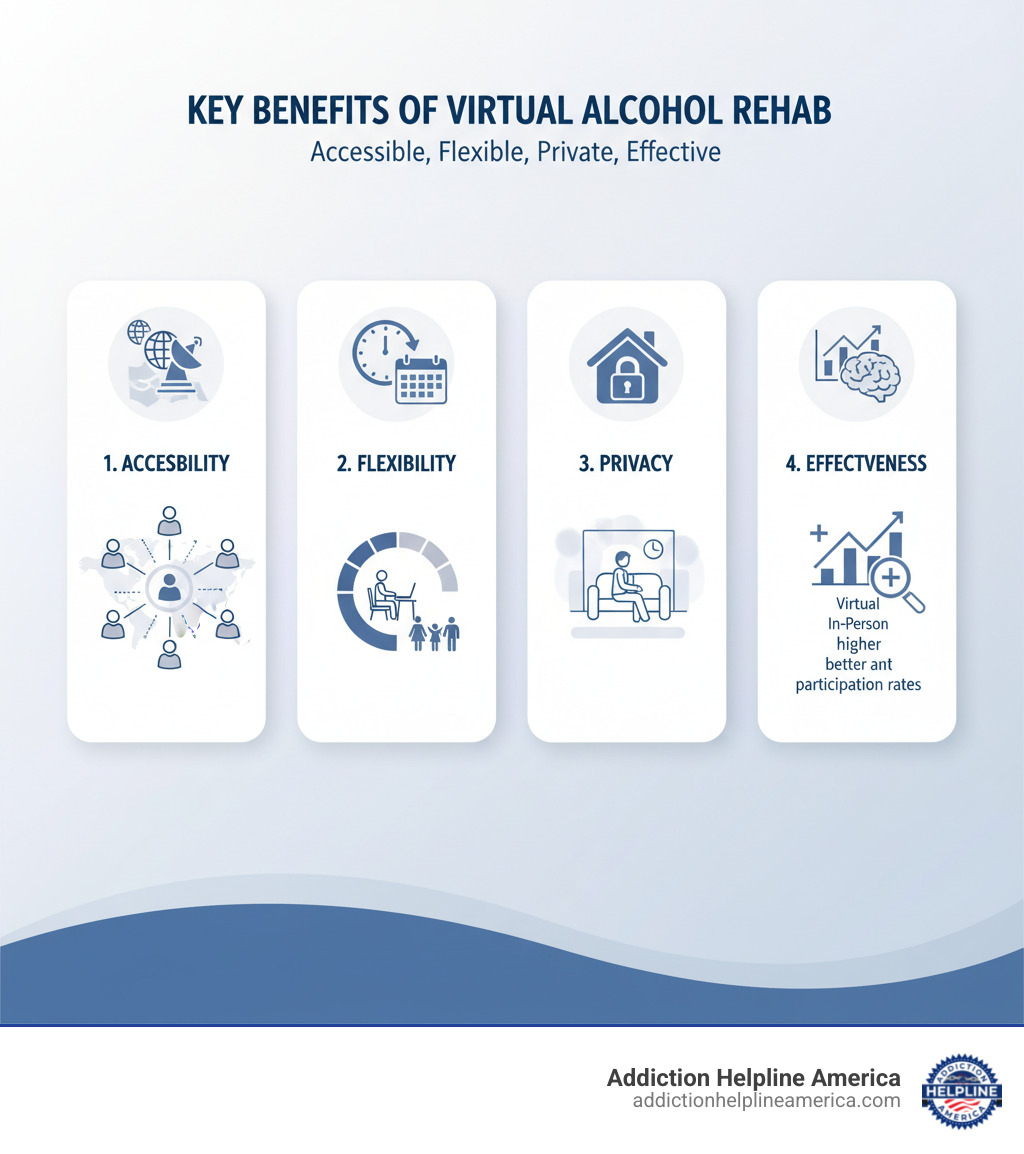
Understanding Your Options for Remote Alcohol Treatment
Virtual alcohol rehab delivers evidence-based addiction care through secure video sessions and digital support from the privacy of your home. It’s a flexible, remote treatment option for those struggling with alcohol use disorder.
Quick Overview of Virtual Alcohol Rehab:
- What it is: Professional addiction treatment delivered remotely via phone, video, and web-based platforms.
- Who it’s for: Individuals with mild to moderate alcohol use disorder who don’t require medical detox.
- What you get: Individual therapy, group counseling, medication management, addiction education, and relapse prevention.
- Key benefits: Eliminates travel barriers, reduces stigma, offers flexible scheduling, and provides the same quality of care as in-person programs.
- Technology needed: Stable internet connection, computer or smartphone, and a private space for sessions.
- Insurance: Many plans cover telehealth services, including Medicare and commercial insurance.
The COVID-19 pandemic accelerated the shift to telehealth, making addiction treatment more accessible than ever. This change helped people overcome barriers like geographic distance, work and family schedules, and the stigma of visiting a treatment center.
Research shows virtual alcohol rehab works. Studies find no significant difference in patient satisfaction or outcomes compared to in-person care. Online programs often have better participation rates due to convenience, and online cognitive-behavioral therapy is just as effective as face-to-face counseling.
For millions of Americans, virtual rehab is a lifeline, bringing professional help directly to those who need privacy, convenience, or can’t travel for care.
At Addiction Helpline America, we guide individuals and families to virtual alcohol rehab programs that fit their needs and insurance. We’re here to help you take the first step toward recovery from wherever you are.
Common virtual alcohol rehab vocab:
What is Virtual Alcohol Rehab and How Does It Work?
Virtual alcohol rehab is professional addiction treatment delivered remotely through your laptop or phone. Instead of traveling to a clinic, you connect with licensed therapists and doctors from home.
This approach was originally created for people in remote areas, but the COVID-19 pandemic proved that quality care can happen anywhere with an internet connection. Most programs mirror traditional outpatient (OP) or intensive outpatient (IOP) structures, with sessions held several times a week. With flexible day and evening options, you can schedule treatment around your work and family life.
Reputable providers ensure privacy with HIPAA-compliant platforms and encrypted patient portals. Your sessions and information are confidential, allowing you to speak freely. If you’re wondering what professional support looks like, our guide on professional help can walk you through what to expect.
Core Services Offered in Virtual Programs
Virtual rehab offers comprehensive, evidence-based services, including:
- Individual counseling: One-on-one sessions with a licensed therapist help you explore the root causes of your drinking, develop coping strategies, and set recovery goals.
- Group therapy: Led by a clinician, virtual group therapy connects you with peers who understand your struggles. It’s a safe space to share experiences and realize you’re not alone.
- Medication-assisted treatment (MAT): A board-certified physician can virtually prescribe medications like naltrexone to reduce cravings. Prescriptions are sent electronically to your local pharmacy.
- Addiction education: Educational sessions teach the science of addiction, coping skills, and relapse prevention strategies. This knowledge empowers you to see addiction as a treatable condition. To explore different therapeutic approaches, check out our page on types of addiction therapy.
- Relapse prevention planning: Your team helps you create a personalized plan to identify triggers and manage high-risk situations, equipping you with tools for long-term sobriety.
- Aftercare coordination: Providers offer continuing care groups, peer support, and alumni programs, often through dedicated apps. Support evolves with your recovery journey, ensuring you’re not alone after treatment.
Technology and Privacy Requirements
Getting started is simple. You’ll need:
- A stable internet connection: This is essential for uninterrupted video sessions.
- A computer or smartphone: Any modern device with a camera and microphone will work.
- A private space: A quiet, confidential area is crucial for focusing on therapy.
Providers use secure, HIPAA-compliant software to protect your privacy, and many offer patient portals for scheduling and communication. All communications are encrypted, and staff are legally required to protect your confidentiality. For more on how your information is protected, you can learn about privacy policies.
Addressing Co-Occurring Mental Health Disorders
Alcohol addiction often co-occurs with mental health conditions like depression or anxiety. Virtual alcohol rehab programs are equipped to treat both simultaneously.
Integrated treatment addresses addiction and mental health at the same time, recognizing they are intertwined and improving chances for lasting recovery. Your virtual team may include therapists and psychiatrists who can provide diagnosis and medication management. If you’re seeking to understand more about this approach, our resource on dual diagnosis treatment facility offers deeper insights.
Virtual psychiatry provides access to specialists who can diagnose conditions and prescribe medication via video, which is especially helpful in areas with limited psychiatric care. Your virtual team can prescribe and manage medications for mental health conditions throughout your recovery, making comprehensive care accessible across the country.
The bottom line is that virtual treatment can effectively address both alcohol addiction and mental health challenges. Integrated care treats the whole you.
The Benefits and Effectiveness of Virtual Alcohol Rehab
Virtual alcohol rehab removes common barriers to treatment, such as distance, scheduling conflicts, and fear of stigma. It makes getting help possible for those who might otherwise go without.
- Accessibility: Virtual rehab eliminates geographic barriers, connecting people in rural areas or with transportation issues to expert clinicians.
- Privacy: Receiving care from home offers powerful privacy. It reduces the stigma associated with treatment, as you don’t have to be seen entering a facility. This comfort can make it easier to open up during therapy.
- Affordability: Virtual rehab is often more affordable than inpatient programs because it eliminates costs for room, board, and travel.
- Participation: Research shows virtual programs often have better participation and completion rates. The convenience of flexible scheduling and no travel makes it easier to attend sessions consistently.
- Flexibility: The flexibility of virtual rehab allows you to fit treatment around your life. You can attend sessions before work or after family commitments, making it possible to balance recovery with your responsibilities.
Is Virtual Alcohol Rehab Effective?
It’s natural to question if treatment through a screen works. The research is clear: virtual alcohol rehab is highly effective. Studies show that online cognitive-behavioral therapy is as effective as face-to-face counseling, with no significant differences in patient satisfaction, substance use reduction, or retention rates.
Patients report high satisfaction, forming meaningful connections with therapists and peers. For many, the screen removes barriers to being open and engaged in their recovery. Success rates are strong, with some programs reporting that 74 percent of their patients remain sober one year after treatment. The key to success is the quality of the program, not the delivery method. Look for accredited programs with licensed clinicians and evidence-based therapeutic approaches.
Potential Drawbacks and Limitations
While powerful, virtual alcohol rehab isn’t the right fit for every situation.
- Medical Needs: It is not suitable for severe alcohol use disorder or those at risk for dangerous withdrawal symptoms, which require in-person medical supervision. Medical detox is critical for heavy drinkers, as severe withdrawal can be life-threatening. Virtual programs are appropriate only after a safe, medically supervised detox is complete. Our alcohol withdrawal timeline can help you understand the process.
- Technology Barriers: Unreliable internet, lack of a suitable device, or low digital literacy can be significant barriers.
- Home Environment: Your home can be a source of distractions. Interruptions from family or pets can make it difficult to fully engage in therapy.
- Lack of Separation: Virtual rehab lacks the physical separation from triggers that inpatient programs provide. You must build recovery skills while living in the environment where you used to drink.
- Licensing: Regulations typically require you to be a resident of the state where the provider is licensed, which may limit your program options.
At Addiction Helpline America, we help you weigh these factors. We’ll discuss your situation to determine if virtual treatment is the right fit or if another level of care is needed. Our goal is to guide you to the best path for your recovery.
Getting Started and Finding the Right Program
Taking the first step toward recovery is the hardest part, but virtual alcohol rehab makes the process more accessible. Here’s how to get started.
The process begins with an initial assessment. A treatment advisor will ask about your drinking history and recovery goals to understand your situation. Advisors also help with insurance verification, clarifying what your plan covers for telehealth services and what your out-of-pocket costs might be. Based on the assessment, they will help you create a personalized treatment plan custom to your schedule, goals, and any co-occurring mental health needs.
How to Find a Reputable Virtual Alcohol Rehab Program
Knowing what to look for is key to finding a quality program. Use trusted directories like FindTreatment.gov and the NIAAA Alcohol Treatment Navigator to find licensed providers. Always verify licenses and accreditations and read patient reviews to get a sense of the program’s quality.
Ask potential providers these essential questions:
- Is the program licensed and accredited in my state?
- What does the schedule look like?
- What technology will I need, and do you offer technical support?
- How do you protect my privacy and confidentiality?
- What happens in a crisis or emergency during a virtual session?
- What’s the total cost, and which insurance plans do you accept?
- Can you treat co-occurring mental health disorders like anxiety or depression?
- What aftercare and alumni support is available?
Insurance and Payment Options
Insurance coverage for virtual alcohol rehab has expanded significantly. Medicare and many private insurance companies now cover telehealth services, often treating virtual sessions the same as in-person visits. However, benefits vary by plan. Always verify your telehealth benefits with your provider or ask the treatment program to do it for you. This free service clarifies your coverage and potential costs. For more general information, SAMHSA provides helpful resources on paying for treatment.
Self-pay options are also available. Virtual treatment is often more affordable than inpatient care because it has lower overhead costs.
The Role of Support Systems
Recovery thrives on community, and virtual alcohol rehab integrates multiple layers of support.
- Family Involvement: Many programs offer virtual family therapy and workshops to help families heal together and learn how to support their loved one’s recovery.
- Peer Support: Virtual group therapy connects you with others who share similar experiences, reducing feelings of isolation and building a sober support network.
- Online Mutual-Support Groups: You can also access groups like Alcoholics Anonymous (AA) and SMART Recovery, which offer virtual meetings at almost any time.
- Alumni Programs: These programs provide long-term connection to the recovery community through apps or online groups. This ongoing support is proven to improve long-term sobriety rates.
Virtual rehab allows you to build a sober network remotely, connecting with people across the country based on shared experiences. At Addiction Helpline America, we offer free, confidential guidance to help you steer your options, understand your insurance, and connect with a virtual program that fits your needs. You don’t have to do this alone.
Frequently Asked Questions about Virtual Alcohol Rehab
Considering virtual alcohol rehab brings up many questions. Here are clear, honest answers to some of the most common concerns.
What if I need medical detox for alcohol withdrawal?
Virtual alcohol rehab is for those with mild to moderate alcohol use disorder who do not require medical detox. Severe alcohol withdrawal can be life-threatening and requires in-person medical supervision. A quality virtual provider will assess your needs during your initial call. If medical detox is necessary, they will refer you to an appropriate facility. You can transition to a virtual program once you are medically stable. You can learn more about what to expect on our alcohol withdrawal timeline page.
How can I be sure my privacy is protected during online sessions?
Reputable providers protect your privacy using secure, HIPAA-compliant video platforms. All communications are encrypted, and staff are bound by strict confidentiality rules. To ensure your own privacy, find a private, secure location for your sessions where you won’t be interrupted or overheard. Using headphones can also help. For more information on how healthcare privacy works, you can learn about privacy policies through SAMHSA.
Is virtual rehab a good option if I have a dual diagnosis?
Yes. Co-occurring disorders are common, and treating addiction and mental health conditions like anxiety or depression together is crucial for recovery. Many virtual alcohol rehab programs specialize in integrated care, providing access to therapists and psychiatrists who can treat both issues simultaneously. For those whose mental health makes leaving home difficult, virtual care removes a significant barrier to getting help. You can learn more about this approach on our dual diagnosis treatment facility page.
Conclusion: Take the First Step Towards Recovery
This guide has shown how virtual alcohol rehab works, delivering comprehensive, evidence-based care like counseling, group therapy, and medication management from the privacy of your home. It offers the same quality as in-person treatment but with greater flexibility.
The evidence is clear: virtual rehab is effective, with outcomes equal to or better than in-person care. It removes barriers like travel, scheduling conflicts, and stigma, making recovery accessible to more people.
If you or a loved one is struggling, know that recovery is possible from anywhere. You don’t have to wait for the “perfect time.” Help is available right now, right where you are.
At Addiction Helpline America, we know it takes courage to reach out. Our team offers free, confidential guidance to help you find a virtual program that fits your needs and insurance. We’re here to listen without judgment and help you take this crucial first step.
You don’t have to steer this alone. Recovery is waiting, and it can start today. Find the right drug and alcohol rehab program for you.
Our helpline is 100%
free & confidential
If you or someone you care about is struggling with drug or alcohol addiction, we can help you explore your recovery options. Don’t face this challenge alone—seek support from us.
Programs
Resources
Will my insurance
cover addiction
treatment?
We're ready to help
Find the best
drug or alcohol treatment
center
Are you or a loved one struggling with addiction? Call today to speak to a treatment expert.
















